7 Top Legal Research Tools for Law Firms
7 Top Legal Research Tools for Law Firms
Legal work runs on research. Before an argument can be written or a motion filed, someone has to find the right cases, statutes, or regulations. That task can take hours if you’re flipping between websites or relying only on memory.
Plus, we must remember that the law changes constantly. Court rulings shift precedent, legislatures pass new rules, and agencies update guidance. Keeping up matters just as much as knowing where to look in the first place.
This is the major reason why legal research tools have become part of everyday practice. They pull together statutes, U.S. Supreme Court decisions, lower court rulings, legal commentary, and even real-time updates.
With these capabilities, you can focus on one reliable system and get back to the real work.
With all that in mind, let’s take a closer look at what these tools are and the platforms legal professionals rely on most.
What are Legal Research Tools?
Generally speaking, legal research tools are digital resources that help legal professionals conduct legal research with speed and accuracy. They’re diverse, ranging from full-scale databases packed with case law and statutes to platforms that focus on legal news, analytics, or court rules.
While they serve different purposes, the general idea is the same: give users quick access to legal materials they can trust.
Most tools pull from both state and federal courts, along with commentary, practice guides, and regulatory updates. And because the law changes constantly, these platforms also make it easier to stay up to date on new rulings and legislative shifts.
Some of the common features you’ll find include:
- Searchable collections of legal materials such as cases, statutes, and regulations
- Coverage of opinions from state and federal courts
- Citation checkers to confirm the validity of cases
- Built-in legal news updates and analysis
- Filters by jurisdiction, topic, or practice area
- Resources tailored for specific legal fields
In general, legal research tools give professionals one reliable place to research, check, and track information that matters for their work.
Top Legal Research Tools For All Kinds of Law Professionals
There’s no single tool that fits every need. Some platforms focus on deep case law research, while others highlight legal news or analytics. Below, you’ll find a mix of options to choose from:
1. LEGALFLY
LEGALFLY is one of the newer legal research platforms gaining traction with law firms and solo attorneys.
It acts like a modern law library that combines classic legal databases with AI support to speed up searches. Whether you’re reviewing federal and state cases, looking at Supreme Court decisions, or following pending legislation, LEGALFLY brings it all into one system.
Source: G2
It also connects with state court websites to offer quick access to legal opinions and updates across jurisdictions.
Beyond case law, the platform provides legal journals, commentary, and information from administrative agencies, which makes it useful for both statutory research and practice-specific needs.
Best Features
- AI summaries: Breaks down lengthy opinions from federal appellate courts and the Supreme Court.
- Case law coverage: Access to federal and state cases across multiple jurisdictions.
- Statutory research: Tools for finding relevant statutes, rules, and regulations.
- Secondary sources: Integration with legal journals and commentary for deeper context.
- Legislative tracking: Updates on pending legislation and new rulings from administrative agencies.
Pros
- Saves time with clear summaries of cases and statutes
- Strong mix of statutory research, case law, and secondary sources
- Connects to both state court websites and federal rulings
- Fits the needs of both large law firms and smaller practices
2. Lex Machina
Lex Machina is designed for legal experts who need more than just case law. It provides litigation analytics that help shape strategy.
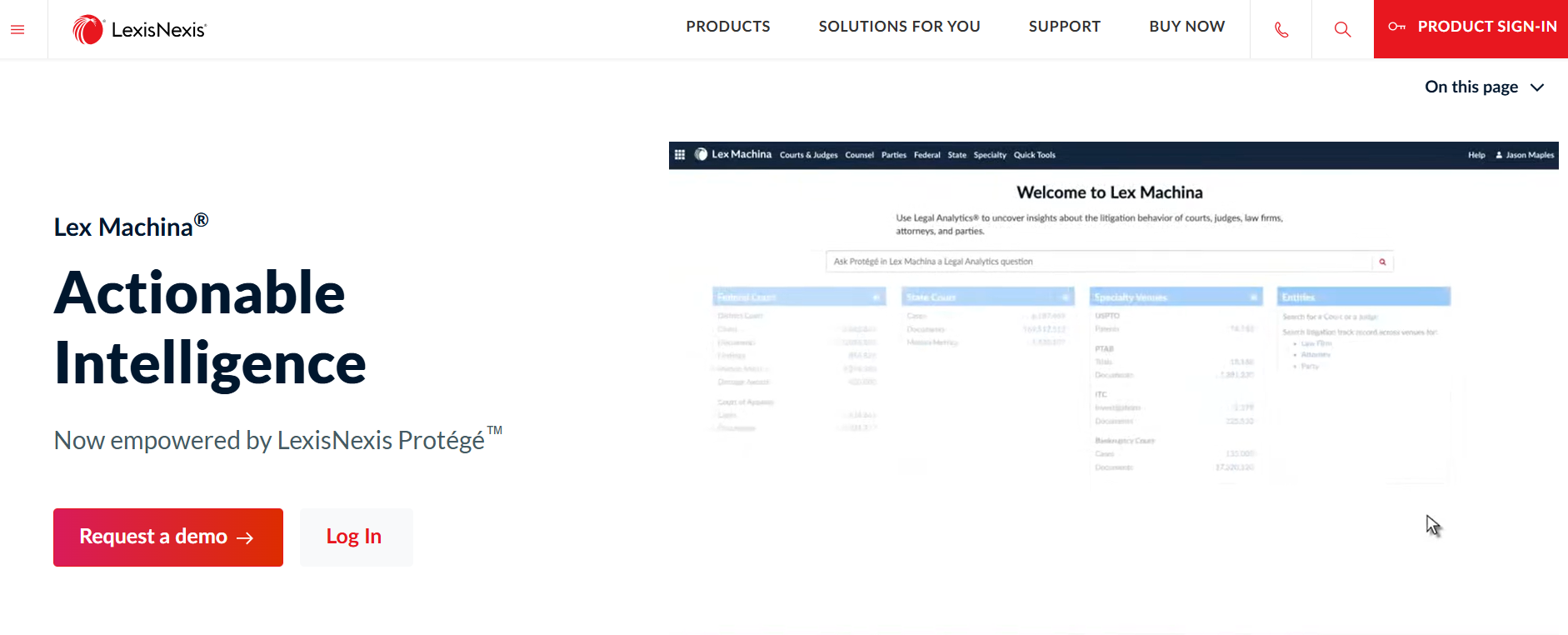
Source: LexisNexis.com
Rather than rifling through a basic searchable database, this platform digs deeper into trends. It can show how judges, courts, and even opposing counsel have handled similar legal issues in the past.
It’s especially valuable for firms that want to prepare with data, not guesswork. Alongside analytics, Lex Machina also gives access to case documents, statutes, and references like law review articles or notes from the Law Revision Counsel.
Best Features
- Litigation analytics: Detailed data on judges, lawyers, law firms, and case outcomes.
- Searchable database: Quick access to case law, filings, and related legal issues.
- Federal regulations: Coverage of statutes and rules that impact case outcomes.
- Secondary resources: References to law review articles and other commentary.
- Historical insights: Information from the Law Revision Counsel and long-term case patterns.
Pros
- Helps predict outcomes with data-backed insights
- Saves time preparing case strategies with detailed analytics
- Strong support for complex legal issues and multi-jurisdiction cases
- Widely used by large firms and litigation-focused attorneys
3. Bloomberg Law
Bloomberg Law is a well-known choice among legal experts and a go-to for both practitioners and the occasional law student who wants deeper insights.
Unlike free legal resources that only cover the basics, Bloomberg offers a vast mix of case law, statutes, and business-focused updates.
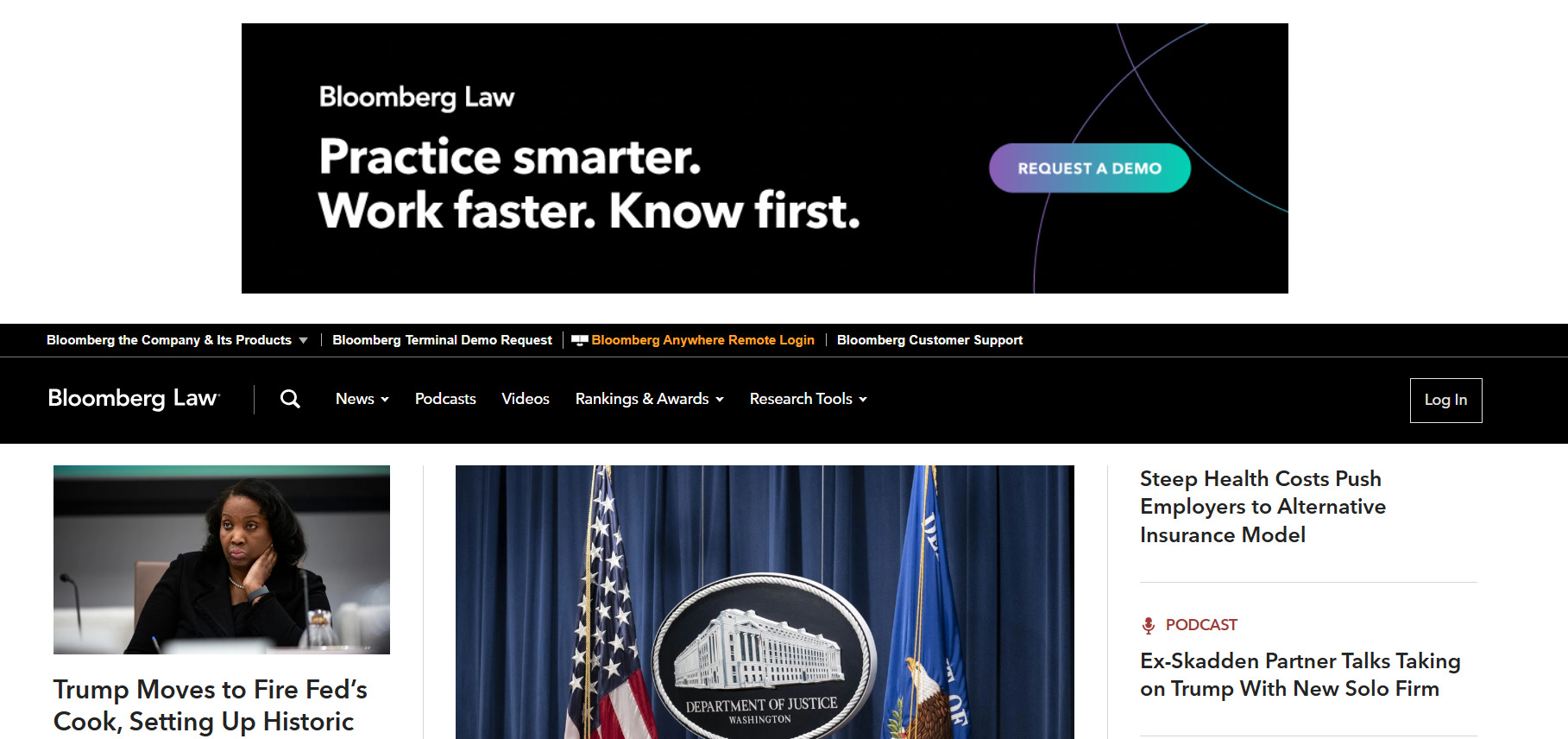
Source: BloombergLaw.com
You’ll find everything from Supreme Court opinions and case summaries to commentary pulled from legal blogs, practice guides, and even a built-in legal dictionary for quick reference.
While some platforms rely only on raw case law, Bloomberg combines traditional databases with news-driven updates to help professionals keep up with both legal and business trends. It also pulls from open-access journals, which gives researchers additional context alongside standard materials.
Best Features
- Comprehensive coverage: Access to statutes, Supreme Court opinions, and detailed case summaries.
- News integration: Ongoing updates that connect legal developments with business and finance.
- Secondary resources: Includes references from legal blogs, practice guides, and open-access journals.
- Research support: Built-in legal dictionary and tools designed for practicing attorneys and law students.
- Case tracking: Alerts on dockets, filings, and emerging case law.
Pros
- Strong mix of legal research and business intelligence
- Includes resources beyond traditional case law, like legal blogs and journals
- Helpful for both practicing attorneys and law students
- Reliable case summaries that speed up research
4. Legal Information Institute
The Legal Information Institute (LII), hosted by Cornell Law School, is one of the most trusted free legal research tools available online. It gives open access to a broad range of legal documents, including statutes, regulations, and U.S. Supreme Court decisions.
For many in the legal industry, this platform is the first stop when they need reliable information at no cost.
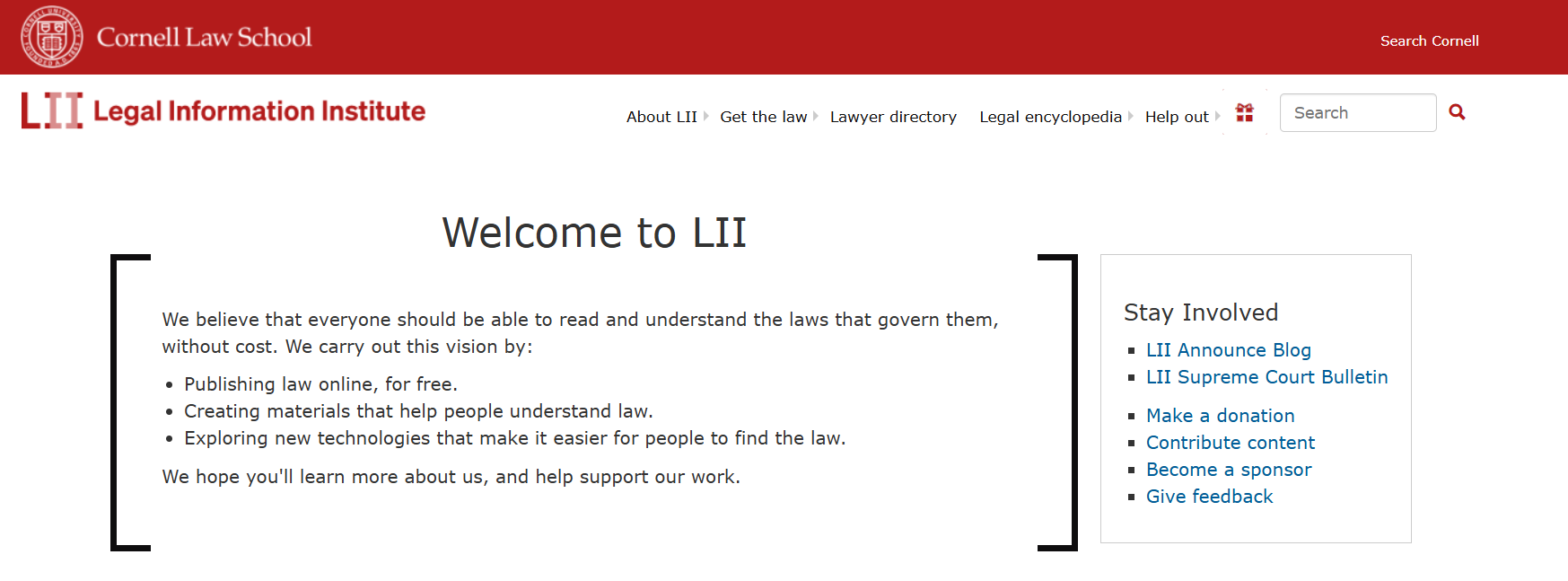
Source: Law.Cornell.edu
What sets LII apart is its focus on free legal research. Users can browse legislative materials, check congressional records, and search through an extensive collection of federal and state resources.
Sadly, it doesn’t have advanced analytics like paid platforms, but it’s a go-to for anyone who needs dependable and straightforward legal information.
Best Features
- Free access: Open-source platform for statutes, case law, and U.S. Supreme Court decisions.
- Extensive collection: Covers legislative materials, congressional records, and key rulings.
- Educational support: Simple guides and explanations for students and non-lawyers.
- Trusted source: Backed by Cornell Law School, respected across the legal industry.
- User-friendly design: Easy to search and navigate compared to many traditional systems.
Pros
- 100% free and accessible to anyone
- Broad coverage of cases, statutes, and legislative materials
- Respected academic source with a strong reputation
- Useful for both professionals and the general public
5. Fastcase (Now vLEx)
Fastcase, now vLex, is a practical option for lawyers who want an affordable yet reliable research tool. Many state bar associations even provide it as a member benefit, which makes it one of the most widely available legal research platforms.
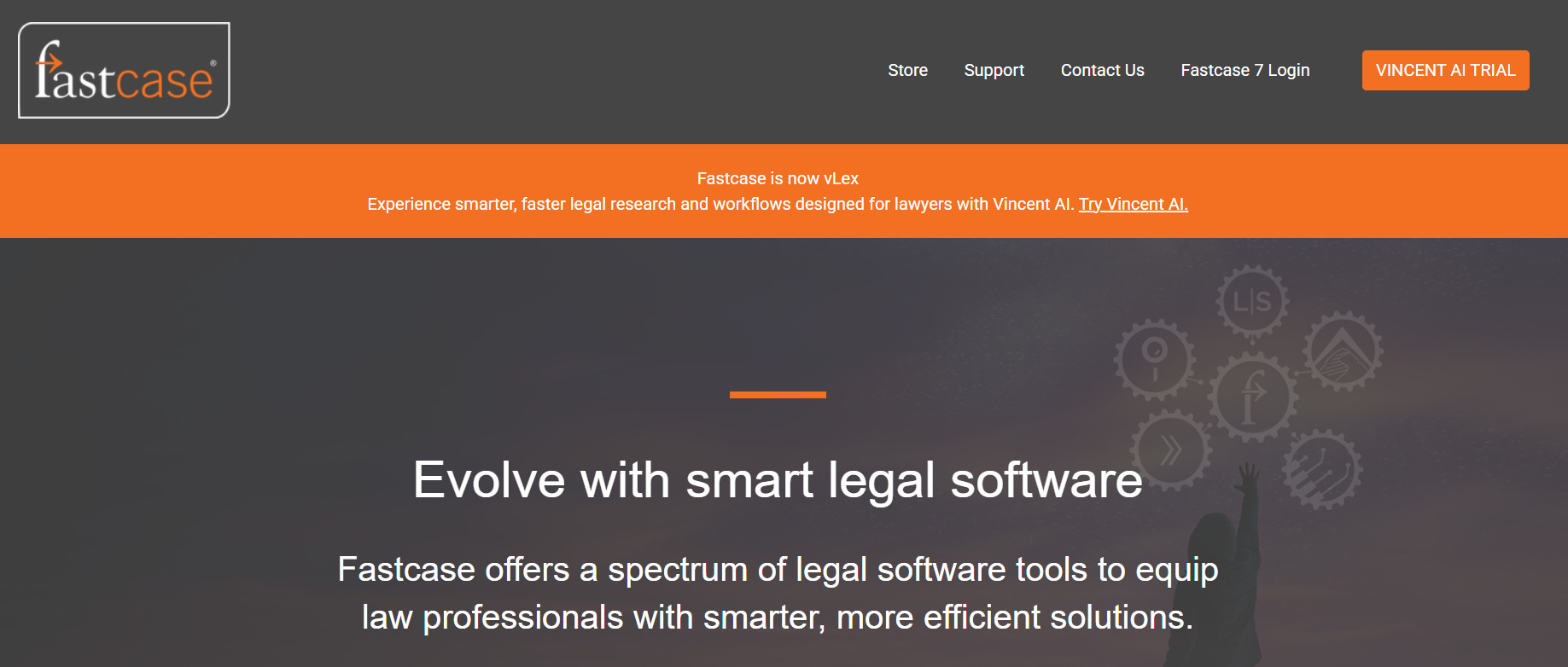
Source: Fastcase.com
Essentially, it covers a wide range of federal cases and state decisions to give attorneys quick access to rulings that matter for their work.
On top of its large database, Fastcase includes advanced search options that help users find relevant rulings quickly. It also provides practice tips and visualization tools, so lawyers can see how cases connect and build stronger arguments.
Best Features
- Federal cases: Broad coverage of rulings from across the country.
- Advanced search options: Filters and tools to refine case law research with precision.
- Visualization tools: Graphs and maps showing how cases are linked.
- Mobile access: Research from anywhere with the Fastcase mobile app.
- Practice tips: Contextual guidance that supports decision-making.
Pros
- Affordable option, often included in bar memberships
- Easy-to-use design with mobile support
- Strong database of both state and federal cases
- Helpful extras like practice tips and visualization tools
6. Caselaw Access Project
The Caselaw Access Project (CAP) is one of the most ambitious free legal research resources available today. Backed by Harvard Law School, it gives open access to millions of U.S. court decisions, including historic rulings and modern opinions.
For researchers, law students, and those with a legal scholarship, CAP is a powerful way to study how the law has evolved over time.
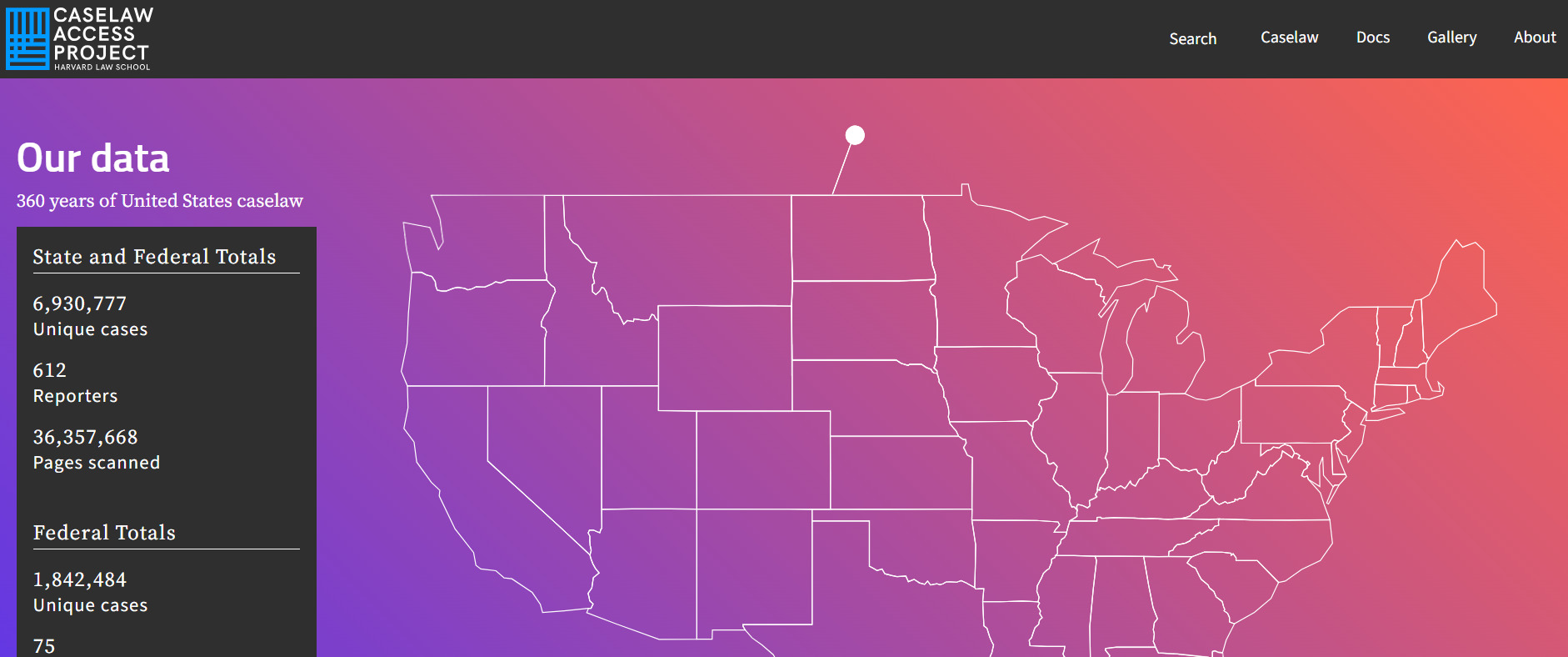
Source: Case.law
The database spans everything from U.S. Supreme Court decisions to state-level rulings, organized by report volume number for accuracy.
While the basic platform is free, CAP also offers paid desktop plans with additional features like bulk downloads and advanced search. It’s widely recognized by groups like the American Bar Association for its value to both academics and practitioners.
In addition to case law, the project gives access to session laws and related materials, which makes it a strong complement to other research tools.
Best Features
- Extensive coverage: Millions of cases, including U.S. Supreme Court decisions and state rulings.
- Reports volume number: Organized referencing for precise case identification.
- Free access: A strong choice among free legal research resources.
- Paid desktop plans: Options for bulk downloads and advanced research features.
- Legal scholarship support: Widely used for studies, journals, and academic work.
Pros
- Open access for researchers, lawyers, and students
- Valuable for legal scholarship and historical studies
- Endorsed by the American Bar Association as a trusted resource
- Combines free use with optional upgrades for professionals
7. Paxton AI
Paxton AI is an emerging tool built to support both attorneys and law firms with faster, AI-driven research.
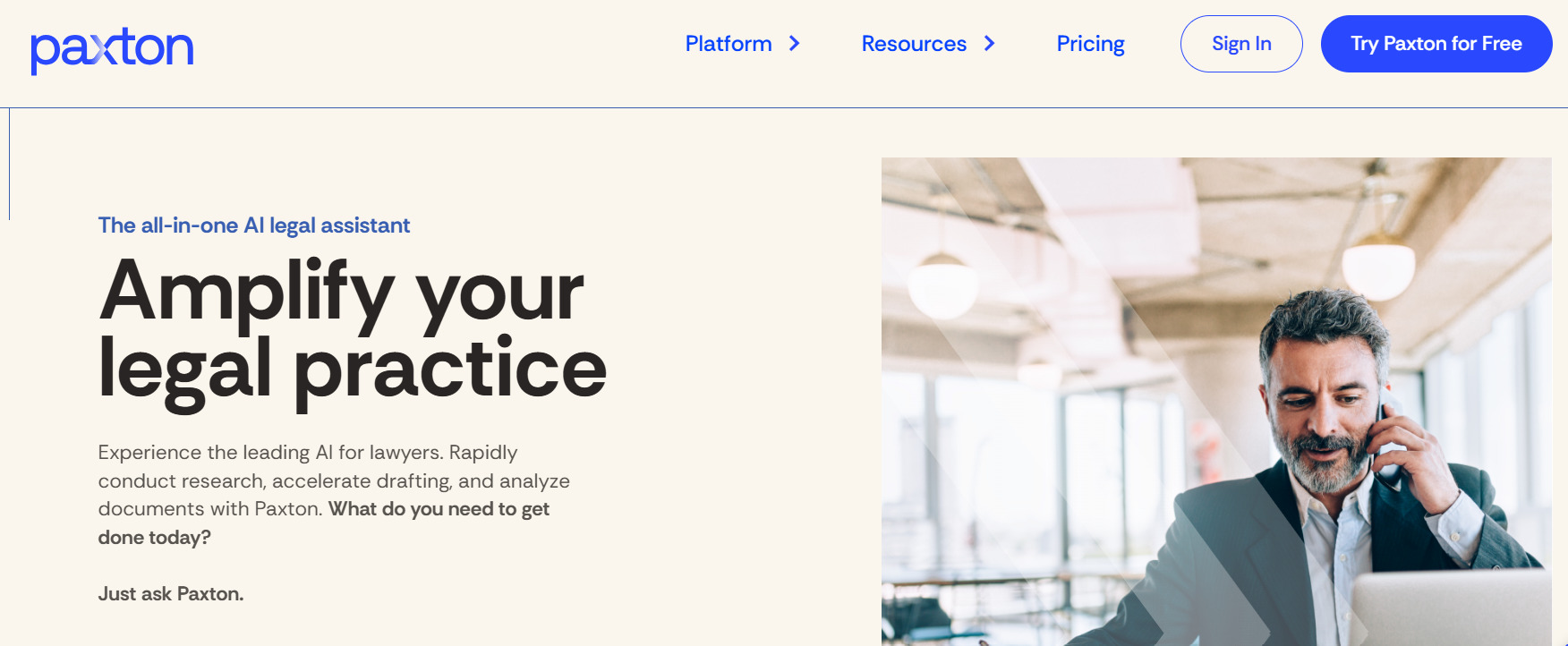
Source: Paxton.ai
Unlike traditional law library systems, Paxton uses natural language processing to interpret questions in plain English and deliver precise results from statutes, federal and state cases, and legal opinions.
What makes it stand out is how it ties traditional legal databases with modern features like real-time tracking of pending legislation and integration with secondary sources such as legal journals.
This balance makes it useful not only for practicing lawyers but also for students who want a more approachable way to conduct legal research.
Best Features
- AI-powered search: Responds to plain language questions and provides targeted case law and relevant statutes.
- Federal and state coverage: Access to rulings from multiple jurisdictions, including appellate and trial courts.
- Pending legislation tracking: Alerts on proposed laws and regulatory changes.
- Secondary materials: References from legal journals and practice commentaries.
- Citation support: Tools to verify and cross-check legal opinions.
Pros
- Speeds up research with AI-generated responses
- Covers both federal and state cases in one platform
- Helpful for smaller law firms looking for cost-effective options
- Combines traditional research with real-time legislative updates
From Research to Ready-to-Serve Documents With Briefpoint
Using legal research tools gives you the knowledge you need, but turning that research into finished discovery documents can still feel like a grind.
Hours spent drafting the same objections, formatting responses, and double-checking consistency take away from time you’d rather put into strategy… or just having a normal evening.
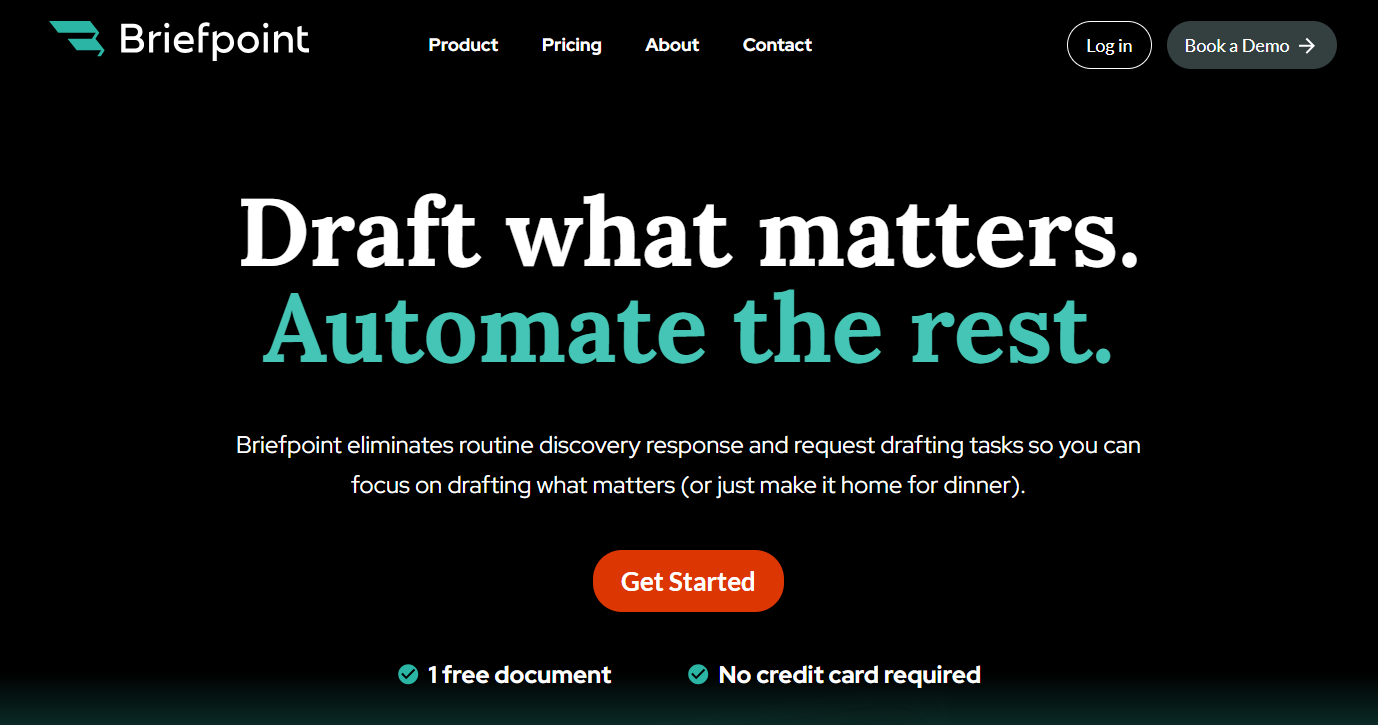
This is what Briefpoint was built to fix. With Briefpoint, you upload requests, add your objections and responses, and within minutes, you’ve got drafts ready to download, sign, and serve.
The software uses secure, litigation-grade AI to suggest content, apply firm standards, and keep everything consistent across your team.
Lawyers using Briefpoint save an average of 87% of their time on discovery documents. It works with tools you may already rely on, and it’s backed by SOC-2 certification and HIPAA compliance, so your client data is protected.
If you’ve ever thought, “There has to be a faster way to get this done,” there is. Book a demo with Briefpoint and find out how much time you can save.
FAQs About Legal Research Tools
What tools do legal researchers use?
Legal researchers often use platforms like LexisNexis, Westlaw, CaseText, Bloomberg Law, and Fastcase. Many also rely on free online legal content from sources like the Legal Information Institute or government sites for quick access to statutes, rules, and court decisions.
What is the best legal research software?
The “best” software depends on your needs. For large firms, comprehensive systems like Bloomberg Law or LexisNexis are strong choices. Smaller practices may prefer Fastcase or CaseText for affordability. Specialists in areas like family law may also choose tools with practice-specific resources.
Is Westlaw or Lexis better for legal research?
Both are widely respected and cover a broad scope of legal information, including statutes, U.S. Supreme Court decisions, and secondary sources. LexisNexis is often praised for Shepard’s citation service, while Westlaw offers powerful search features and deep coverage across practice areas.
Which is the best database for legal research?
For comprehensive coverage, LexisNexis, Westlaw, and Bloomberg Law are leading options. If you’re looking for something free, the Legal Information Institute provides access to statutes and rulings. Many researchers also use databases maintained by the Administrative Office of the U.S. Courts for direct federal materials.
The information provided on this website does not, and is not intended to, constitute legal advice; instead, all information, content, and materials available on this site are for general informational purposes only. Information on this website may not constitute the most up-to-date legal or other information.
This website contains links to other third-party websites. Such links are only for the convenience of the reader, user or browser. Readers of this website should contact their attorney to obtain advice with respect to any particular legal matter. No reader, user, or browser of this site should act or refrain from acting on the basis of information on this site without first seeking legal advice from counsel in the relevant jurisdiction. Only your individual attorney can provide assurances that the information contained herein – and your interpretation of it – is applicable or appropriate to your particular situation. Use of, and access to, this website or any of the links or resources contained within the site do not create an attorney-client relationship between the reader, user, or browser and website authors, contributors, contributing law firms, or committee members and their respective employers.